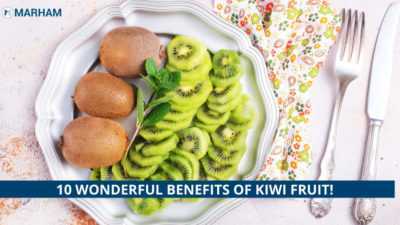Kiwi fruit is a nutritional powerhouse that offers plenty of health benefits. From boosting immunity to reducing the risk of cancer, there are many reasons to include kiwis in your diet. Here are some of the top benefits of kiwi fruit for weight loss, eyesight, skin, and more.
Kiwi Fruit Calories and Nutrition


1 cup of kiwi fruit (approx. 152 g) contains about:
- 130 calories
- 3 grams protein
- 1 gram fat
- 32 grams carbohydrates
- 11 grams fiber
- 750 milligrams potassium (21 percent DV)
- 250 international units of vitamin C (42 percent DV)
One serving of kiwi fruit is also a good source of other vitamins and minerals, including vitamin E, copper, magnesium, and folate.
10 Wonderful Benefits of Kiwi Fruit
“Kiwifruit are a nutrient-dense fruit and extensive research over the last decade on the health benefits of kiwifruit has linked their regular consumption to improvements not only in nutritional status, but also benefits to digestive, immune and metabolic health.” – The nutritional and health attributes of Kiwifruit
Here are some of the amazing benefits of kiwi fruit for health:
1. May Aid in Weight Loss
Kiwi fruit is a low-calorie food that is high in fiber and nutrients. In fact, research has shown that eating kiwis can help promote weight loss.
2. Boosts Immunity


The high vitamin C content in kiwis makes them an excellent fruit for boosting immunity. Vitamin C is a powerful antioxidant that helps fight off infection and disease.
3. Improves Digestion
Kiwifruit is also rich in dietary fiber, which is essential for good digestion. Fiber helps to keep you regular and prevents constipation.
4. Reduces Inflammation
The antioxidants in kiwi fruit can also help reduce inflammation throughout the body. Inflammation has been linked to a number of chronic diseases, including heart disease and diabetes.
5. Promotes Healthy Skin


Kiwi fruit is also great for your skin thanks to its high vitamin C content. Vitamin C is a powerful antioxidant that helps protect the skin from harmful free radicals, which can accelerate aging and cause wrinkles, sun spots, and other signs of premature aging.
6. Strengthens Eyesight
Kiwi fruit is a good source of lutein and zeaxanthin – two antioxidants that are especially beneficial for promoting healthy vision. In particular, these nutrients can help prevent age-related macular degeneration (AMD), an eye condition that causes irreversible damage to the retina and can lead to vision loss.
7. Lowers Blood Pressure
Kiwi fruit is rich in potassium, a mineral that plays an important role in regulating blood pressure. Studies have shown that eating foods high in potassium can help lower blood pressure and reduce the risk of heart disease and stroke.
8. Reduces Risk of Cancer


Kiwis are also rich in antioxidants and phytonutrients, which may help protect against certain types of cancer, such as breast cancer and colon cancer. Eating plenty of fruits and vegetables high in these nutrients has been linked to a reduced risk of various types of cancer.
9. Promotes Heart Health
In addition to its beneficial effects on blood pressure, kiwi fruit is high in fiber and low in fat, making it a heart-healthy choice. A high fiber intake can help lower cholesterol levels and reduce the risk of heart disease.
10. Delicious and Nutritious
Of course, perhaps the best benefit of kiwi fruit is its delicious flavor and nutritional value. Whether you enjoy them on your own or add them to smoothies, salads, or other recipes, kiwis are a healthy snack that everyone can enjoy!
Also read: Excellent Kiwi Benefits for Fertility, You Should Know
How to Eat Kiwi Fruit for Optimal Health?


There are many different ways to enjoy kiwi fruit for optimal health. Here are some tips for eating kiwi fruit:
- Eat it on its own as a snack, either whole or sliced, and scooped out with a spoon.
- Add chopped kiwis to yogurt, smoothies, or salads for an extra boost of nutrients.
- Use pureed kiwi fruit to make sauces or dips for added flavor and nutrition.
- Freeze peeled kiwi slices and use them as ice cubes in drinks like water, tea, or lemonade for a refreshing treat year-round.
- Marinate kiwis in apple cider vinegar and use the mixture as a salad dressing or marinade for fish and chicken.
- Experiment with kiwi recipes from around the world, such as kiwi chutney, kiwi mousse, or kiwi popsicles.
No matter how you choose to enjoy your kiwis, be sure to include this delicious and nutritious fruit in your diet for optimal health!
Consult a Nutritionist!


If you have any questions about how to eat kiwi fruit for optimal health, be sure to consult a registered nutritionist or dietitian. They can help you create a healthy eating plan that includes all the foods you need for good health, including kiwis!
A Nutritionist can also offer tips and advice on incorporating kiwi fruit into your diet, as well as provide guidance on any potential health concerns or allergies you may have.
Click here to find the Best Online Nutritionists via Marham.
Can’t Find the App?
| Android | IOS |
|---|---|
  |
  |
FAQs
1. What are the benefits of eating kiwis?
Kiwis are packed full of vitamins, minerals, and antioxidants that help protect against disease and promote overall wellness.
2. How much kiwi fruit should I eat a day?
Most experts recommend eating one to two servings of kiwi fruit per day. This can either be in the form of whole kiwis or as part of a smoothie or other recipe.
3. Which fruit is better apple or kiwi?
There is no definitive answer to this question, as both apples and kiwis offer a variety of benefits. However, if you had to choose between the two, kiwis may be the better option due to their higher nutrient content.
4. What are the disadvantages of kiwi fruit?
One of the main disadvantages of kiwi fruit is that it can be difficult to eat for some people. The fuzzy skin and small, oval shape of kiwis make them a bit tricky to peel and cut.

